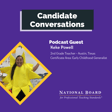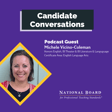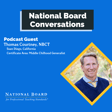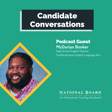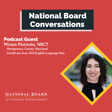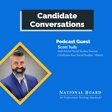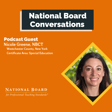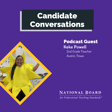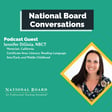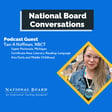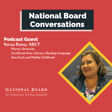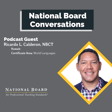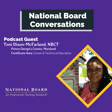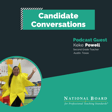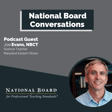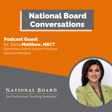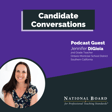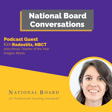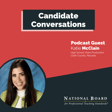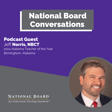Become a Creator today!Start creating today - Share your story with the world!
Start for free
00:00:00
00:00:01

Juliana Urtubey - 2021 National Teacher of the Year
Transcript
Introduction and Guest Overview
00:00:01
Speaker
What's going on everyone? Welcome back to National Board Conversations. We have a special episode coming up for you. On the eve of National Board Score Release Day, I have the absolute pleasure of speaking to the 2021 Teacher of the Year, Uleana Utube. We discuss her career to this point, her tour in the country as the Teacher of the Year, and much more. She also has a special message for those of you waiting to score. Okay, I'll stop talking now. Here's my conversation with Uleana.
Passion for Education and Certification
00:00:27
Speaker
Hey, Williamna, this is such an honor for me to speak to you forever. We haven't spoke since, what, 2019 at this point? Man, it's crazy to think about, but I'm glad to be able to finally get some time to sit with you. How are you doing today? Eddie, I'm so happy to be here with you today. I know it feels like that time before COVID has stretched out into forever, but I'm happy to be here. You know, talking to you is a great honor for me because one of the things that makes me the most passionate about education is national board certification.
00:00:57
Speaker
Thanks for having me. Oh, yeah, y'all like listen y'all passion make me passionate. So let's go. Oh, well, you don't really need an introduction. I feel like you're pretty popular, but we'll get with you. And anyway, what's your current role in job and a brief intro of what you do?
00:01:12
Speaker
Uh, you are going to make me blush. Um, everybody needs an introduction. Um, but my name is Juliano. I am a proud national board certified teacher. I certified in the area of exceptional needs birth to age 21 in 2018. So that means this year or the second of a gear I'm working on my maintenance certification and I'm excited. Um, so I was a 20, 20, no, I'm sorry. Let me go back. Cause we're not allowed to use past on this.
00:01:41
Speaker
always needs to be like working on the way we speak about our practice. I am the 2021 National Teacher of the Year, so I spent all last year traveling the country speaking about the lessons and the wonderful attributes of my students and my school community.
00:01:59
Speaker
So I'm a special education teacher at heart. I'm a bilingual teacher. I'm passionate about authentic, healthy family relationships at schools. I am super big about advocacy and teacher leadership, and really looking at ways that teachers can sustain their practice day in and day out. So I guess that's the best way to describe my title, because my title is a little bit of this, compuquito de eso, all together, and that's what I'm working on.
00:02:28
Speaker
a little bit of everything. All right, so we're gonna get to know Juliana outside of her title a
Personal Interests and Inspirations
00:02:32
Speaker
little bit. So what are your three favorite foods?
00:02:35
Speaker
Ooh, okay. Number one, favorite food, bandeja paisa, which is not a food, it's like a dish. It's from Colombia. And again, it has a little bit of everything in there, right? You have like frijoles with white rice, you have plata no dulce, plata no maduro, then you have chicharron, then you have morcilla and some, you know, it's a little bit of all of like our traditional- Listen, you hear me start, it sounded like home, my mom be cooking, oh man.
00:02:59
Speaker
I know. It's my favorite thing. It's my favorite thing. I think number two would be sancocho, which again is another Colombian dish, which basically we get a big pot and we throw everything in a potato. It's kind of like a stew, but not really. I think my mother would be very offended if I called it a stew, but you throw everything together and then you serve it over white rice. And there's a pattern here. Cause number three is arrozco leche, which is a dessert. You love this rice, huh?
00:03:29
Speaker
You know, I do. I do. All right. So what are the last three songs on your Spotify playlist? And do you have Spotify? I found that a lot of our teachers have Pandora or Apple Music or Tidal. I do have Apple Music. OK, so the last three songs on the Apple was on the Apple Music.
00:03:47
Speaker
Okay, we have some Santi Gold. Okay. That's like my pump you up song. I have been listening, it's not a song, but I've been listening to the entire last Black Panther album. Okay. Beautiful start to finish at Canada's one song. And then the last thing I listened to is
00:04:11
Speaker
Marshmallow. I'm trying to stay hip with the kids. The movie is like five steps too late. Are you doing well? Are you doing well? All right. And so the one sports scene that has your heart, and if you're not a sports person, a movie you can recite long for long. Can I answer both? Go for it.
00:04:32
Speaker
Okay, so Columbia World Cup. Oh yes, World Cup time. I know, we didn't make it, we didn't make it. And you know, it broke my heart to read, Jaime is one of like the most famous players on the team talk about how his soul was broken because we didn't make it. And I thought that was beautiful and heart wrenching. So it's been on my mind a lot. And a movie I can recite is Eurovision, Fire Saga.
00:05:02
Speaker
Oh man, that is different. It's a good story, your faith and humanity type music movie. Okay, okay, I like it, I like it, I like it. All right, so now we'll go back to the classroom side. Why did you become a teacher and why do you remain connected to education now?
00:05:19
Speaker
Yeah, I think that about when I was in second grade, I had a student that was a peer in my class and he had Down syndrome and he had a one-on-one aid. And somehow I found myself being his second one-on-one aid and just wanting to really build what I didn't know then, but what are now inclusive practices to make sure that he had friends and that he felt like part of the class and he authentically was part of the class.
00:05:49
Speaker
Fast forward to high school, there was an opportunity to be part of a teacher, a future teachers class.
00:05:55
Speaker
And the athletic director Scott Brown was running it and he recruited me. Look, he had also recruited me for golf, of which I was terrible at. And I just drove the golf court around. I mean, I didn't even know high schools had golf teams, but- Yeah, listen, we took a golf session in high school once. And it was like, wow, this is really different than swinging a baseball bat. I was so used to swinging a baseball bat. And then swinging the golf, wow, this is a completely different thing.
00:06:23
Speaker
I bet. But you know, like, that's the point of education, expose you to things that you normally wouldn't have tried. So this teacher taps me on the shoulder. I was like me, he's like, yeah, you'd be great. So I enroll. And I go to the schools to do the observations that we have to do as part of the class.
00:06:40
Speaker
And I see a bunch of kids that look like me and not a whole lot of teachers that look like me. And I saw an opportunity to build bridges, an opportunity for education to like reflect who the kids were. And I just was sold on that moment. I just was committed and here we are.
Lifelong Learning and Community Support
00:07:00
Speaker
Look at that, young Houliana, getting her, getting her feet wet and teaching it. So what do you enjoy most about being an educator?
00:07:09
Speaker
I love that being a teacher means you are committed to learning the rest of your life. We never know everything we need to know, but the people who usually teach us those things are students. I love learning from my students. I love learning from their families. I love learning from my colleagues. It's this idea of really being a lifelong learner that keeps me really excited to be an educator.
00:07:36
Speaker
So you talked about it, you certified in exceptional needs. What were some of your favorite lessons? I can understand, that's probably difficult to like put together like a cohesive lesson sometimes just because things change literally by the second. So what were some of your favorite lessons to teach while you were teaching?
00:07:54
Speaker
So I really loved teaching my students all about their brain and all about understanding our emotions and understanding how to navigate this world with our emotions in collaboration with others, right? So that's a big thing to teach elementary students with special educational needs, but this idea of I get to be well within a community of people who are well.
00:08:19
Speaker
Right. And so I love teaching my students about how different parts of their brain impact their learning and impact their emotional wellness, but also how they can support other people in being well, too. So we would do that in the garden. You know, all of my favorite lessons take place in a garden or in my classroom, but are garden related. So we raise monarch butterflies.
00:08:41
Speaker
We planted the plants outside. We waited for the eggs to be laid. We'd go catch the eggs. We'd raise them in my classroom. And for months, all of our learning would be centered around monarchs and learning about monarchs. And it was just awesome watching my students, like their curiosity and their awe just come alive. That sounds amazing.
00:09:05
Speaker
And so, so like we said, you're national board certified. What puts you to pursue and what was your journey like? Did you stumble along the way?
00:09:14
Speaker
Look, I don't think you go down this journey without stumbling. And that's part of the process. That's part of the beauty is you get to learn so much about who you are as a practitioner, but also who you are as a person, what you believe you know, and then why you know those things. So I came across National Board at a time in my career where I was really wondering, am I an effective teacher?
00:09:40
Speaker
the principal observations and evaluations that I got once or twice a year said that I was, but how did I know that? How did I know that I was truly uplifting my students brilliance by designing, learning that would, right? And so somebody, I was having this conversation and a lot of the times these conversations with the teachers happen
00:10:02
Speaker
in this way that we say, do we stay or do we go? Is what I'm doing worthwhile, is it worth it? And so this person suggested that I check out National Board.
00:10:13
Speaker
So I go and I check out like a cohort at a school and I'm, you know, flipping across some of the materials and I'm like, this is amazing. You can tell it was written by teachers. This is key to me, right? But I'm in a room where it's all white teachers and it's at a different school than mine. And most of them teach at that other school and their conversations, the way that they were framing it just didn't feel right to me. I didn't feel like I belonged in that space. And I said,
00:10:43
Speaker
This is a really big commitment. I better feel like I belong in this before I take a leap. And I kind of left the room. And I think one of the teachers saw me and she was probably concerned that I had had a bad experience. And she came out to talk to me and she said, look, I just heard of this new organization that is supporting teachers. You might want to give them a call.
00:11:04
Speaker
And so I call that person up. Her name is Dr. Tonya Holmes Sutton. And she had just, yeah, the Data Professional Board Learning Institute. And she welcomed me with open arms. That's an understatement. I show up to that Saturday. I had never met this woman in my life. She gave me the biggest, warmest hug. And she said, you know, for the first time I was in a room with other teachers of color.
00:11:33
Speaker
focusing on how to improve our practice, how to improve student learning, centered with our identities. And I flourished because of that. I flourished because of that mentorship. And my journey was hard. I did all four components in one year. I've had to put a lot of other things in my life aside. I'm grateful for the support that I received and I certified in that first year. And in that year, before I even got results, my practice was transformed for the better.
00:12:02
Speaker
So where every anything was hard and difficult, there's always five, six, seven, ten lessons to learn from that instance.
Certification's Impact on Teaching
00:12:11
Speaker
No, for real. And I think that sense of belonging definitely helps. And having that sense of belonging can help you persevere through things that you think might be tough. Right. Like I said, the process is tough. So being able to have that sense of belonging, like, no, like I belong here. I can do this. Where if you don't feel like you belong, you like you will walk out like you walked out of that room.
00:12:31
Speaker
that where the teachers where you didn't feel like you belong. Absolutely Eddie and you know what I always worry about is when we walk out of those spaces we walk out thinking something's wrong with us. There's nothing wrong with it. There's nothing wrong with us what's wrong with the systems that are taught to see us in like these these ways right of not
00:12:51
Speaker
seeing space as bountiful enough for all of us to be our truest selves no matter where we are, right? And so, yeah, I learned that through that process. And, you know, what you experienced is something really important to amplify because as teachers, our job is to ensure none of our students ever feel like that.
00:13:10
Speaker
Oh, it's, it's, it's important to have a sense of belonging, especially in like with the, with how important school is. Like it's just an important space and having everybody feel like they belong there is important. So how did becoming an NBCT impact your career? Like you said, breathe to gain your results. You felt like you flourished. And so afterwards, how did, how did it go?
Systemic Barriers for Teachers of Color
00:13:31
Speaker
So I think what impacted me the most is I now had a framework
00:13:38
Speaker
to see my students through. I had a framework to see my practice and that framework was the body of knowledge, right? So for folks who aren't familiar with it yet, it's standards that are specific to what you teach, five core propositions of what all teachers should know and be able to do, of which one of those is
00:13:58
Speaker
you know, really understanding equity, right? It's embedded in all of that. And then the third is this architecture of accomplished teaching. It's the set of reflective questions that you ask yourself and the learner together, you answer them about learning and what's next, right? And the whole thing centers your students. So I now had this lens, this framework to prove that I was an expert.
00:14:25
Speaker
to prove that every single decision I made in the classroom was for my students. And if it wasn't serving my students, then I had a lens to adjust and pivot, to redesign, to collaborate with my peers and their families, to be able to figure out, OK, how do I do this in a way that this student can really flourish? And so it impacted my career, my practice in that way.
00:14:50
Speaker
on a teacher leadership lens, it gave me kind of the, and I use this word, you know, with a little bit of strife, the authority to speak about education on behalf of educators, right? Sometimes you need that stamp of like expertise in a way. It's like, no, like I know what I'm doing here.
00:15:11
Speaker
And that's why I wear my pin. Eddie, look, I traveled the country all the last year and I pinned over 200 teachers across this country that are national board certified that may or may not have received a pin. And I asked them to wear it because of what their students signified to them, what the power of
00:15:31
Speaker
our students being our best teachers means, what it means for us to listen. And a lot of teachers don't want to wear their pins because they feel shy. They're like, oh, I don't want to be boastful. I'm trying to fit in. But like Brené Brown says, fitting in is the polar opposite of belonging. We want to belong as experts. We want to be ready when people have questions about how to improve education. We're ready because we've been listening to our students all along.
00:16:01
Speaker
No, that's amazing. And so at the National Board, we are going through our own journey on social equity. I was recently at the, or the National Board was recently at the Black Male Educator Conference. It was amazing. We're going through our own journey on social equity to be able to provide NBCTs in every community across the country. How can National Board certification provide a lens for educators in underserved communities to be more effective to their students' need?
00:16:28
Speaker
Yeah, that is the question of our time, right? That is 100% our question of our time is how do we understand one, how organizations, individuals, systems show up in a space, right? What is the positionality, right?
00:16:45
Speaker
And what's the impact? So we know that the number of teachers of color that certified through National Board mirror the number of teachers of color in the classrooms across the country, which means that we are significantly underrepresented.
00:17:04
Speaker
Right. And it's not that we can't do it. Right. The question can never be framed. Well, can they do it? Yes, of course we can do it. Right. The question is what barriers visible and in variable visible and invisible barriers exist that prohibit us from certify. Right. And through that and through asking those questions, maybe in different spaces, it doesn't matter what organization you are.
00:17:31
Speaker
in asking those questions, you're gonna have to contend with systemic issues, colonial issues, racism that's built on capitalism, right? You're gonna have to contend with all these layers of our society and have to do, you're gonna have to do it boldly. You're gonna have to do it on apologetically and with a humanistic lens. So for me personally, my students have always been my best teachers. They helped me build a garden
00:17:57
Speaker
Well, we built a garden together with their families in the school community. And through building this garden, you know, transforming 50,000 square feet of garden of unused or grass areas into garden spaces where my students can learn. I learned that for me, the most two important things of education are joy and justice, right? We have to have joy in everything that we do and joy is thriving, joy is belonging. And we have to be part of building just systems.
00:18:27
Speaker
Right? It's not just about convincing the other person that we belong here or whatever. No, it's not even, we're not even gonna play those games. This is about knowing that everybody has brilliant stories to share. Everybody has brilliant knowledge and everybody has the capacity and we're just not gonna accept anything less. So how do we build systems that truly uphold equity and justice, right? And so I think,
00:18:55
Speaker
For national board, there's yet a lot of work to do, but we also have to celebrate the incredible work that has been done. We know that when there is national board certified teachers in underserved communities, that those students do better. We know that when those schools are able to retain those teachers, long term that school does better.
00:19:15
Speaker
So we know that we're on the right path, right? I think it's about listening really carefully to teachers, particularly teachers of color, and continuing to allow that to inform the work. So what do you think has been lacking in the recruitment process for teachers of color?
00:19:36
Speaker
Do you mean in the profession itself? In the profession itself, what areas have been lacking in the recruitment process for trying to get teachers of color into the classroom, into leadership positions anywhere for her? Yeah, it's a multi-layered issue, right?
00:19:53
Speaker
For some folks, the lack of prestige and perceived prestige of the teaching profession is an issue. You'll often hear folks say, my parents didn't migrate and leave their home countries so that I could be living paycheck to paycheck.
Challenges in Recruiting Teachers of Color
00:20:12
Speaker
A lot of the times, folks of color, we are within intergenerational families and we're responsible for supporting financially, emotionally, our families. And sometimes teaching is perceived as a profession that takes so much and doesn't give you much.
00:20:30
Speaker
We got to turn that around. A lot of the times, too, I've heard a lot that students want to become teachers. But when they're looking at what it takes to become a teacher through a traditional four-year model, it means that they have to go semester of unpaid internships. That's too much. They're not going to do it. So we need programs that say, well, we're going to pay you.
00:20:53
Speaker
come be a student teacher, and we've seen the number of student teachers increase, right? So I think that a lot of it is that, and then I think another part that's kind of hard to talk about for a lot of people is that either we or our families have experienced a whole lot of trauma in public education, right? Languages have been stripped from us, identities, assimilation is a powerful tool, and
00:21:22
Speaker
You know, those are just big systemic things. Sometimes, you know, parents will tell me about issues that they had, times that they were treated really unfairly that have marked them forever. If that's the reality of so many people of color, I don't think it's fair to ask them to go into these same systems. What we have to communicate is saying, hey, these systems are changing. Hey, there is autonomy now. The purpose of education is to build
00:21:50
Speaker
youngsters to be their truest self, to be independent, to be collaborators, to be creative, to do all these things, you know, in essence, to right those wrongs. And so I think that that's the work that we have ahead of us, right? Is how do we make
00:22:04
Speaker
Schools, a place where all people of color thrive. That's how we get more teachers of color. Our students have to see us happy. They have to see us loving what we do, right, to want to be teachers. Yes, and I think like environment is a big deal about that. I harp on this all the time. I was like, my school growing up, it felt like a prison.
00:22:24
Speaker
I would not have wanted to go back there to be a teacher, just based on the fact that concrete floors, steel doors, like it was like, this is just not an inviting place to come back and want to work. And so just little things like that from when you were a kid, like stick with you throughout your whole life. And so if we want to get more teachers of color in the future, we got to start when they're young.
00:22:47
Speaker
Yeah, for sure. Like you just went to the Black Male Educator Conference, right? You know, what do you think? I know that you're interviewing me, but I'm curious. No, it's cool. You learned an incredible opportunity that you got to go. What do you think put those folks there? What got them to want to be educators? Man, I don't know, but I think
00:23:10
Speaker
framing what teachers are in a different way. Like you just talked about at the top, like there's a lack of prestige around the profession. And I think shaping it in a way of you can build the future you want by being a teacher, like is the way we need to start framing it. It's like, look, you can literally take responsibility for what's going on.
00:23:35
Speaker
in the, like, that can, or what can happen in the future. So that way you can go in the classroom, teach these kids, and you can show them how you want things to be done or how things might want to be done or how things should be done in our communities. And so, I don't know, like, framing the messaging around what a teacher is and then things like that are very, and what comes from being a teacher, right? Like, I talk about all the time, my third grade teacher, Ms. Holmes.
00:23:59
Speaker
She changed my life just by believing in me. So if you show belief in a little kid, that could change his life.
00:24:07
Speaker
Yeah, and it's an incredibly important topic to have more Black male educators, right? Yes, like I watched the video on Twitter not too long ago about a Black teacher, a Black male teacher, lotioning up a little boy for school picture day. And there was a lot of terrible comments on it, but there was also so many awesome comments like, yo, we need more of this.
00:24:32
Speaker
other teachers just wouldn't know what to do with this like it was it was really cool but then it was like man people are really negative towards teachers and it's like I can understand why people don't want to get into that profession because I don't know sometimes it feels like you're being attacked all the time yeah that is tough right and and that is something that's so important about national board certification right this certification
00:24:56
Speaker
shows that we're experts, right? It's not just asking us about the content knowledge that we have. It's about how we apply that content knowledge within this understanding that our students need to be socially and emotionally well.
00:25:10
Speaker
Right? And we see the whole picture. And so having National Board Certified Teachers talking about our practice really elevates the profession. And that's the work, right? That's the work is seeing that that teacher who lotioned that beautiful boy's face, I saw the video. And the way he was beaming a little straight away. Yes, it was so cute. I was like, yo, this is amazing. He was so happy. I was like, why y'all so named? The little boy was happy. The teacher was happy. Like, it was no problem.
00:25:37
Speaker
Those are things that only people that share those cultural connections can do for somebody. And by shining that little boy's face, he's saying, I believe in you. You are beautiful. Let's make you feel the most confident you can before you take that picture. And it's also like this deep rooted respect into knowing, hey, I know your parents and your family paid a lot of money for those pictures you're going to get.
00:26:01
Speaker
I want to honor their hard work and their money by doing that, you know? So there's so much more that goes into that teacher's decision, right? This is what National Board is. National Board is asking teachers to dive deep and why did you choose to put lotion on a little boy's face?
00:26:16
Speaker
The teacher made it as what seems to be a subconscious quick decision, but it's not. There is so much that goes into what that teacher knows about those students, what that teacher knows about how those students do their best, what that teacher knows and the pedagogical braining that that teacher has, that expertise to say, I'm going to do this because of this, and the result's going to be this, and then we're going to do that, right? It honors that knowledge.
00:26:46
Speaker
No, and like that little kid's self esteem, you probably went into every single class with just feeling good. Like, all right, there's nothing that can take no type of work, nothing that can take me down, but we won't harp on stuff. So we're going to get into your teacher of the year, year.
Traveling as Teacher of the Year
00:26:59
Speaker
You are the 2021 teacher of the year. We're gonna speak in active tense, like you were saying. You are the 2021 teacher of the year. What was it like? Like you said, you traveled across the country, penned over 200 teachers. What was your interview schedule like? What were you like? It's going to everything. Yeah, look, what I tell people is I try to be as transparent as possible. It was beautiful, but it was hard.
00:27:26
Speaker
It was, that's the work of teaching. Sarah Brown Westling, who's also National Board Certified Teacher, who's also the 2010 National Teacher of the Year, she directed the program from CCSSO. And she was my mentor through and through. She was my friend, she was my teacher through the whole process. And she told me, your classroom just got a whole lot bigger.
00:27:50
Speaker
And she was right. And so a big part of that was inner work. It was the reflection of what is my story? How do I frame my story in a way that's dignified, in a way that advances this narrative on who we are as Latino educators, who we are as first generation folks, who we are as linguistically gifted folks, who we are as teachers.
00:28:13
Speaker
And I put myself in a really vulnerable place because I, for me, what works for me is authenticity. Like I gotta be vulnerable and authentic because that's how I connect to people, right? I dash a little bit of humor in there to soften some bones. The truth is, is I had to figure out who I was and give myself full permission to be myself on stage.
00:28:39
Speaker
Um, I talk a lot about how I have, and I'm always going to navigate through it. Public speaking anxiety. I'm telling you it's not easy, man. Like, listen, when I'm going through journalism school, like you have to take a public speaking class and it was, it was not easy. Like writing a speech and all of it, it was, it was difficult. So yes, anxiety is real.
00:29:01
Speaker
Not even to mention all the physiological things that happen when you get put on stage in front of lots of people. Some people get the cold sweat, some people's stomach, some people's throat. So I had to work through not just that, but why I had that. Why did I feel like my voice
00:29:23
Speaker
needed all this stuff to be heard. Right. And so that helped me really, I feel connect to a lot of teachers, because I think that that is a huge thing with teachers is we don't feel worthy enough, we don't feel experts and like we're experts enough, we don't feel like we know it, you know, all that we have to squash.
00:29:42
Speaker
and really let who we are come through. So yeah, my travel schedule was tough. I got to go to tons of different conferences and schools and places that I would have never gotten to go myself. I got to go to places where Latinas were not on stage, had never been on stage, right? And here I am as very likely the first Latina National Teacher of the Year.
00:30:06
Speaker
And I got to do it with a lot of conviction, right? Because my students got to come with me to every little pocket of places that I got to go to. They were at the White House. They were in national stages. They were at schools across the country. My students were with me every single step of the way. And so, yeah, I learned probably more than I taught anybody.
00:30:33
Speaker
And, you know, it's a journey that will continue, you know, it's you're always the 2021 National Teacher of the Year, you know, that's, that's a role and responsibility and privilege that I get to continue for the rest of my life. That's amazing. And so you talked about the public speaking anxiety, how did you get over? So what was your take for public speaking? And how did you get over it?
00:30:54
Speaker
Look, there were so many things that I had to do to make it work. Part of it was kind of what I said, you know, really figuring out what was the root cause. Why was I so afraid to speak in public? And then the other part was having confidence in my story, right? And I'll tell you that teachers that I presented to boosted me with confidence time and time again. And I think what did it for me there was they would tell me how they connected to my story.
00:31:22
Speaker
I had black teachers, I'm not black, but I had black teachers tell me that using the term linguistically gifted to honor their vernacular, right, to honor the way they're able to show up in spaces helped them feel
00:31:38
Speaker
better about themselves. I had teachers who, you know, had similar stories of mine, like they're first gen too. And they were able to connect with families on a different way than nobody else on campus was able to, but they were the only person. So it was, it was hard, right? Talk about that. So we connected. There was students, there was teachers who I didn't share very much cultural connection with, but we share our students did.
00:32:03
Speaker
Right. And so the strategies, the tips, the stories help them see their students in a different way, you know. And so I think that teachers just constantly fed me with confidence because I was connecting, you know, and I think that that helped me say, OK.
00:32:20
Speaker
My story, my voice isn't exceptional, right? It shouldn't be like 0.01% of something to say. Everybody has something to say. Everybody has something to teach you. Everybody has an incredible story. And mine was just one of many. And so that kind of helped me. And then a lot of meditation, a lot of deep breathing, a lot of like physicality when I stand on stage, like I'll lean forward, I'll talk louder, you know?
Teaching as a Pathway to Social Justice
00:32:47
Speaker
And I think the last thing I'll tell you about it,
00:32:50
Speaker
is that I think I also learned how generous and kind people are as individuals, but also as collective audiences. So if I needed a moment, they were gonna give it to me. And then I started saying, hey, I'm gonna cry in my speech. I don't need to be rescued. I'm gonna be okay. But if you're one of those people who likes to cry and you're gonna cry with me, I thank you in advance.
00:33:18
Speaker
Right, you had tons of people crying. Not because I was saying anything so enlightened, nah, it was- When your birds make people cry, like shout out to you. But you know what, Eddie, I think what it was, was we were giving ourselves permission to be ourselves in spaces where we don't do that often. And so we got to experience things that we had pushed down and we got to just be ourselves, you know? Yeah, so that's what helped me work through it.
00:33:46
Speaker
That's dope. And so being yourself, if you had to sell the teaching profession to someone looking to get into it in one to two minutes, what would you use as your elevator page? Yeah. I would tell them that what I hear teachers saying most often about why they became teachers is they want to be the teacher that they never had.
00:34:08
Speaker
They wanna be the teacher that students need. And there's something inside of them that says, I can do that. I can be that person, right? And if that's something inside of you, if you're considering being a teacher, you gotta listen to that voice because there is no profession that is as rewarding, that is as challenging, that is as beautiful as teaching. I believe that teaching is a pathway to social justice
00:34:35
Speaker
It's a pathway to building a world that truly humanizes everybody so that everybody can thrive.
00:34:41
Speaker
And that's why I'm a teacher because I sincerely believe in humanity. And also because it's so much fun. You're never gonna get told in any other profession that you're beautiful, that you're cute, as much as students are gonna tell you. When they slip little notes into your pocket and you get home and you read this little note that you had forgotten about, and the students thanking you for a silly thing that you didn't even think was so important, but for them made their day.
00:35:08
Speaker
those are the moments that you're like, okay, yeah, I know why I'm doing what I'm doing. You know, so it's granular, it's molecular, but it's also like, universal teaching is the backbone of our society. All right, we like to be like, I thought about it, but I'm not sure. Let me know if I convinced you otherwise I got to go back to the drawing board with my two minute elevator pitch.
00:35:36
Speaker
All right, I'll let you know when I'm in the classroom. I'll become National Board Certified too. Stop. No, I'm counting on you. Sorry, what was that? I said year one, you're going to be National Board Certified. I know, it's like, listen, I have no, now that I work here, and if I actually do go in the classroom, I have to become National Certified, because I was on board when the process opened. I was like, oh man. We're going to help you. We'll help you. All right, so who was your favorite fictional TV or movie teacher?
00:36:05
Speaker
Hands down, every single teacher on ABBA Elementary.
00:36:10
Speaker
Okay, I like that show is everything. Look, let me just start off by saying I know it's not like realistic teachers don't ever go like five teachers on the hallway to chat. Doesn't matter. The heart and love for teachers behind that show is everything is everything. So I think I love Barbara because she tells it like she is, you know, but I love that entire show. I think Quincy Brunson is
00:36:37
Speaker
Genius, I think she's a genius. And I was listening to her recently talk about why she wrote the show. And there's two parts that I think will really feed the teacher's soul. The first is because she was in the classroom with her mom. Her mom's a teacher and she was there visiting from LA, didn't have a whole lot of time to spend with her mom, but she went and spent the day at the classroom. They had parent-teacher conferences from 12 to 8 p.m. Nobody showed up.
00:37:05
Speaker
Nobody showed up. This is Quinta's day with her mom. Nobody showed up at 755 or something like that. A parent shows up and Quinta finds herself being annoyed that her mom's sitting down and having this conference with his parent, even though they showed a plate. And Quinta's mom said that is a time this parent could come. And I'm going to be there for them because they showed up. And from that moment on, she was committed to writing the show. That's amazing.
00:37:34
Speaker
And then she goes and she names it after one of her teachers. Right, I got to meet her at the Black Male Educator Conference. Hey, she seems to be the sweetest, best teacher ever. I got to meet Ms. Abbott, it was so cool. Yeah, Ms. Abbott, I'm telling you.
00:37:52
Speaker
The way she, I don't know if you've seen some of the videos that they've done on her, where she like takes out the scrapbook. Yeah. So many pictures of Quinta doing all this stuff. Guarantee that a teacher has pictures of all of her students doing stuff, right? So it's not just the superstars that get to write these shows that are breaking all kinds of records, but it's every single student. And so what I love about Abbott Elementary is that it's bringing teachers into everybody's living room.
00:38:20
Speaker
showing that the power of what we do is really important. And I feel like there's going to be like an unlimited amount of stories that you can write about schools for. So this is a show that can go on forever. Yeah, and they get it right. They get so much right.
National Board Certification Journey
00:38:37
Speaker
So score release is coming up. What do you want to say to the folks that are about to achieve and those are going to continue their journey?
00:38:45
Speaker
Yeah, it's a big night. It's a big night. I remember being in that spot myself and waiting and just...
00:38:53
Speaker
for that whole time from when I submitted my portfolios to when I opened up my score, I was going back and forth. Did I provide enough evidence? Was I clear enough? Was it concise enough? Was it clear? You know, all this stuff. And I just, there was a lot of doubt. But one thing's for sure. It's that national board is about the journey, right? And even once you certify, it's about what do you do with that certification, the what's next.
00:39:19
Speaker
So I really encourage all folks, if you see the fireworks celebrate, you've worked really hard and know that you have the lens to ask the questions to keep growing. If you don't see those fireworks when you open up your score, I know that that can be heartbreaking. Give yourself permission to feel whatever you need to feel about it. It's okay, it's okay. Sometimes you hear stories about people missing by just like fractions of points.
00:39:50
Speaker
It's about the journey. So give yourself time to feel whatever you need to do, and then immerse yourself with a community that's going to help you plan your next steps of how you can become certified. Know that there's a huge community of National Board Certified Teachers out there who are ready to support you. And then finally, no matter where you are in the process, pay it forward. Those people that have poured support and love and knowledge into you, do it for others now that you have submitted some components or now that you are
00:40:16
Speaker
certified. Regardless, welcome to the community because this is a community of growers and learners and no matter what you scored, you're part of this community.
00:40:30
Speaker
No, that's good. All right, so we have a feature on the podcast called the shoulder tap. It is when you give a tap on the shoulder to someone to let them know they are ready to become national board certified. So with that context on here, you'll give them a quick shout out and we'll tag them on social media and make it public so everybody can pressure them into becoming certified. So who are you shoulder tapping?
00:40:52
Speaker
Look, I'm not going to shoulder tap a specific person. I'm going to shoulder tap a group of people. And this year I've had the opportunity to work with a lot of teacher mentors. So they're kind of like coaches. Every school kind of structures it a little bit different. But these are the teachers supporting teachers. I want them to become national board certified because mentors are the teachers who
00:41:19
Speaker
truly believe in our work. Right. And for me going through my national board certification, although it was a lot of hard work, it was a gift to myself. It was a gift of time and reflection, and a gift of, you know, learning that yes I am an expert because I've gone through this process.
00:41:38
Speaker
And so I believe that mentors and I had a couple friends that, you know, we had a conversation about this yesterday. So shout out. They're already national board certified, Kathleen. We had this conversation yesterday. So it's fun. But we were talking about how the wealth of knowledge that national board
00:41:58
Speaker
signifies is great. It's so great for teachers who are supporting other teachers, especially early career teachers. I can't imagine what a different teacher I would have been if year one I sat down and read the standards for exceptional education.
00:42:15
Speaker
what I needed to know how to do, right? Or from day one, I started using the architecture of accomplished teaching for lesson planning, every single one of my lessons. I would have been a completely different teacher and a better teacher right off the bat, right? So I want mentors to become certified both for themselves, but also for the potential that it has on their school community. Right, all right. And where can the people find you on social media?
Conclusion and Acknowledgments
00:42:41
Speaker
Really simple. I'm pretty sure I'm the only Julian Orto way out there. But sometimes if you look at from Miss Earth, which is the nickname my students gave me, you'll find it under there, but it's usually at Julian Orto way, just like that. Okay, well, thank you Julian. This was so much fun. It was amazing speaking to you.
00:43:00
Speaker
Likewise, Eddie, I love that we got to catch up a little bit and talk, you know, education. I got to tell you, I appreciate you and who you are and what you do for National Board. Oh, I have to tell you that when I came to National Board headquarters, right before the pandemic, I was so happy.
00:43:16
Speaker
to see another person of color there, Latino, just somebody I could vibe with and somebody who was able to bring your lens to this work. I think it's really important. So I'm really happy that you're part of the team. So thank you for what you do. Well, that means a lot. Thank you so much.
00:43:33
Speaker
Powerful words from Juliana there. Teaching is social justice. Remember that. I want to thank her again for taking the time to chat with me and share her story. And thank you for taking the time to listen to National Board Conversations. Be sure to follow the National Board on social media for all National Board related updates. And we'll see you next time.
